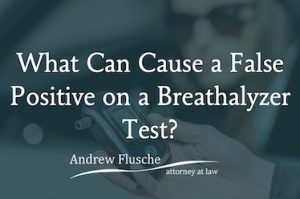What Can Cause a False Positive on a Breathalyzer Test?

In most cases, DUI laws prevent intoxicated drivers from operating motor vehicles and allow law enforcement to arrest individuals who violate the law.
However, circumstances can arise when police officers improperly arrest or charge someone with DUI.
Virginia law prohibits drivers from operating a motor vehicle when their blood alcohol content (BAC) is at or above .08%. Failure to comply with this law can result in a charge for Driving Under the Influence (DUI).
Even if your BAC is below .08%, authorities can charge you with DUI if your ability to operate the motor vehicle is impaired due to the presence of alcohol or drugs in your system. You might be wondering, How can law enforcement determine what my BAC is?
The most common method used to determine a driver’s BAC at the scene of the traffic stop involves the use of a breathalyzer test.
I can answer the questions you have about DUI arrests in Virginia.
Validity of Breathalyzer Tests in Virginia
Virginia law authorizes individuals suspected of DUI to submit to a preliminary breath analysis to determine the “probable alcoholic content” of his or her blood.
However, the law does not allow the introduction of the results of the PBT into evidence. Police officers typically conduct the PBT at the scene of the traffic stop.
Officers then obtain a second breath sample at the police station with a device that is significantly larger and more accurate than the PBT.
The court allows admission into evidence of the results of the second breath test, as long as proper procedures were complied with. Generally, law enforcement performs the breathalyzer at the police station multiple times to ensure its accuracy.
Still, inaccurate readings occur in some cases.
Issues That Can Cause a False Positive on a Breathalyzer
Like any piece of equipment, breath analysis machines must undergo routine maintenance to stay in good condition.
Additionally, the smallest presence of chemicals in the room of the breathalyzer or in the suspect’s mouth can alter the results of the test. Listed below are the most common causes of breathalyzer false positives.
Lack of Proper Maintenance and Testing
The Department of Forensic Science (DFS) requires breathalyzer machines to be calibrated routinely for results to be admissible in court.
Virginia statutes require DFS to test the accuracy of breathalyzer machines at least once every six months. Without proper calibration, the breathalyzer machine can inflate the BAC reading.
Additionally, officers must conduct a test of the breathalyzer between each sample taken. An attorney can request a record of the tests performed on the breathalyzer machine around the time of your arrest and ensure that the breath machine was used properly to obtain your breath test results.
Law enforcement must place a breathalyzer machine in a room with adequate ventilation. Officers must consider factors including excessively high or low temperature within a room or the presence of contaminants such as dust or moisture when determining the location for the breathalyzer.
Presence of Mouth Residue
The presence of alcohol and other liquids inside a person’s mouth can alter the accuracy of a breathalyzer reading. Alcohol residue can linger in your mouth for a variety of reasons.
Certain metals from dental work or piercings can contain alcoholic residue as well. Breathalyzers are supposed to measure the BAC of your breath only.
However, if someone has alcohol residue inside their mouth, the breathalyzer measures the BAC of both the air and the mouth. This can result in a BAC result that is higher than it should be.
Observation Period Requirements
The Department of Forensic Science requires breathalyzer administrators to observe DUI suspects for a 20-minute period prior to performing the breath test.
The 20-minute observation period allows for the absorption of any residual mouth alcohol prior to the test, thereby lessening the chance of an inaccurate reading.
A failure to observe the observation period requirement can warrant excluding the breath test results from the prosecution’s case.
Medical Considerations
Certain medical conditions can lead to a false positive breathalyzer result. For example, excessive amounts of acetone in your breath can cause an inaccurate BAC reading.
Individuals with hypoglycemia can experience elevated levels of acetone in their breath, which could result in a higher BAC reading. Gastrointestinal medical conditions can also cause false positive breathalyzer results.
Inadequate Training or Experience
To be considered valid evidence, Section 18.2-268.9 of the Code of Virginia sets requirements for who can administer the test. An individual must possess a valid license to conduct the breath test with the specific equipment used and in accordance with methods approved by the Department.
The Department of Forensic Science administers the training required to obtain a valid license. If an unlicensed police officer administers your test, a DUI lawyer can fight to exclude the results from evidence.
Contact a DUI Lawyer Today
Now you know what can cause a false positive on a breathalyzer test. If you believe your BAC results are inaccurate, do not hesitate to contact my office to discuss your case.
BAC results often make up the strongest evidence against you in a DUI case. If a breathalyzer false positive occurred, a DUI criminal defense attorney can advocate for excluding the results from evidence.
Without the BAC results, we might be able to negotiate with the prosecutor to lessen or even dismiss your DUI charges, depending on the circumstances of your case. Contact my office today for a consultation.